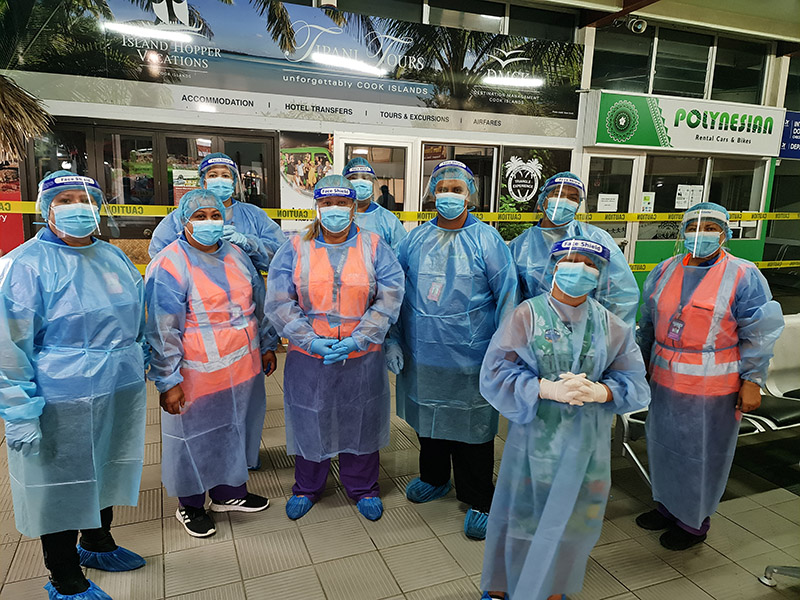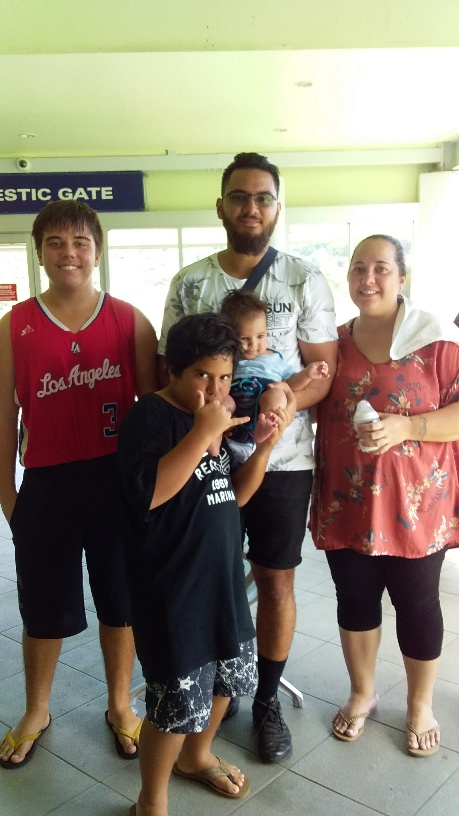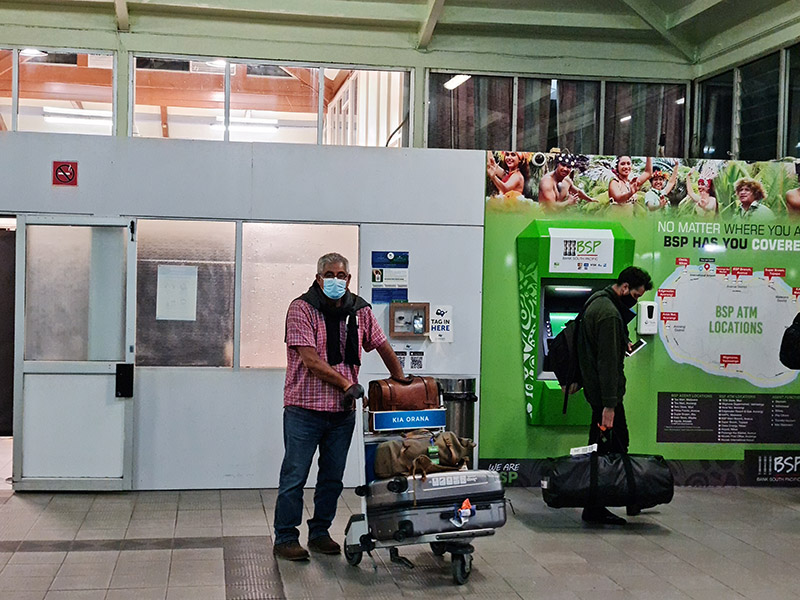The ‘smooth’ journey home
Saturday 9 October 2021 | Written by Supplied | Published in Local, National

(File photo) Rarotonga health workers at the airport in the PPE (Personal protective equipment) gear. CI NEWS/21100827
The first group of Cook Islands people, residents and workers caught in New Zealand as a result of the latest Covid outbreak, arrived back on a repatriation flight in the early hours of Thursday. One of those onboard was Tupapa resident Derek Fox who shares story of his journey to Rarotonga and his early days of Managed Isolation and Quarantine at the Edgewater Resort and Spa.
It wasn’t hard to spot the passengers intending to travel on Flight NZ1980. Many or maybe most were known to each other. If not by name, by appearance. Which shouldn’t be a surprise because afterall we were either Cook Islanders or people who live or work there.
We’d gathered in Christchurch, not normally a jumping off point for the Cook Islands; but today – Thursday 7 October – we’re here waiting to go on a repatriation flight chartered by the Cook Islands government to bring us home. We’re leaving from Christchurch because either by luck or intent we happened to be outside of Auckland when New Zealand went in to ‘lockdown,’ after an outbreak of the highly transmissible Delta variant of Covid-19 in Auckland.
Because we’ve been outside of Auckland where the outbreak has been at its worst, when we get back to Rarotonga we’ll be required to go into Managed Isolation and Quarantine (MIQ) for a week; the group of people stranded in Auckland scheduled to fly back a week after us, will have to do two weeks quarantine.
Both groups have been required to take and pass a Covid test within three days of travel. We’re required to be at the airport three hours before the flight, but most of us are there well before then.
We sit in family or little groups. There’s a fairly large boisterous group with some familiar faces in it. Well-known Cook Islands identities like Captain Moko, a.k.a. Steven Kavana and his wife Jilly. They came to New Zealand on separate missions and got caught when the border closed because of the lockdown. He to have a hip replacement – so golfers beware – and she to settle her elderly parents into a retirement home.
There’s a young mother with two young girls who haven’t been home for three months, missing a whole term of school.
There’s a senior member of the staff of the New Zealand High Commission who was caught here, but who was lucky in that his family is with him, and he simply continued working in the office in Wellington.
There are other individuals sitting round, including a cohort of youngish men. One I recognise as a former barman from one of the island’s best-known watering holes, and another whose family I know very well.
His story is one that multiplied many times over, represents a tragedy for the Cook Islands.

Kevin Wichman, his wife Josie Rattle and their three sons; Te Ina, Koteka and Baby Kevin – Kevin Jr. SUPPLIED/21100825
I know Kevin Wichman as a hardworking honest young father and family man, the sort of citizen every country needs plenty of.
Pre-covid, he and wife Josie had a little business down at the Muri night market, selling Kev’s roasts; many of you will know it. With the arrival of Covid and the collapse of the tourist trade, the business was left high and dry.
Kev sort other work in a small roadside food outlet. But that too closed.
Kev and Josie have two young boys, but with work all but dried up and another baby on the way, he took the plunge and joined a group of men who left to take up seasonal work in a meat works in Bluff; at the southern tip of New Zealand’s South Island – almost the end of the earth, more than 4000-kilometres from home.
Work in a meat works is not the most pleasant job on earth, but it can put food on the table for your family and a roof over their heads. But working in Bluff with the family in Rarotonga is pretty tough.
In Christchurch Kev told me how much he missed his family, he needn’t have, I had already seen it in his eyes. While we were talking, I doubt he was actually taking in the scene in front of him, rather his mind’s eye was probably in Rarotonga with Josie the boys and their new baby boy. Already I knew that his mother and father-in-law – Niki and Colin Rattle – couldn’t wait to see their family reunited again.
That reunion was a victim of Covid-19 too. Kevin’s season at the meat works had come to an end for the year, and he had booked a flight back home. But the night before he was due to leave, the border closed and he was stranded without work for two months, until Flight NZ1980 came along. So, while the boisterous crew were celebrating their return home in their way, Kev was sitting quietly waiting for the doors to International to open, for the plane to board, and to get out of here. As many others were, myself included.
Eventually they did and we did.
The flight was relatively uneventful. Yes, there was a very ‘choppy’ bit as we flew parallel to the East Coast of New Zealand for half an hour or more, but then it was smooth for the rest of the way. The flight was a charter and the aircraft much larger than we really needed. The crew were jovial and helpful. We didn’t leave till after 9pm and were served dinner about an hour and a half later.

Derek Fox arriving at the Rarotonga International Airport. SUPPLIED/21100826
I couldn’t sleep as we roared on into the night. I kept wanting to get here, I hadn’t seen my wife Jaewynn and our son Tinirau for three months, and like Kev I was missing my family. I passed the time by watching a favourite movie and when that was over, we were almost here.
I knew previous repatriation flights had been met with much fanfare, but I doubted the late hour and the very stringent anti-Covid provisions would allow that in future.
What did greet us was a very smooth and what seemed to be well organised army of border and health workers; all in PPE (Personal protective equipment). Our small number made for fairly quick processing, our bags were sanitised before entering the terminal, and so were we. It was strange not seeing a crowd of people greeting their loved ones as we filed out onto waiting buses and taken to the MIQ facility.
Again, it was a smooth operation. Remember this is now about 4am. We were shown to our rooms. It was nice being offered something to eat when we arrived, but I for one wasn’t up to it.
Since arriving we have been swabbed once again and all been found Covid-free and two days in we’re starting to settle into a routine.
Our return home went pretty smoothly. In a way it was a trial run for the much bigger operation with the next cohort of returnees, more than three times our number, and coming from the area where Covid has been loose in the community. Their journey home has been more precarious. I wish them and us good luck.
Meanwhile I have a nice room with a view of the sea. Just like my home at Mahia in New Zealand I fall asleep and wake up to the sound of the ocean, in both cases the same ocean. I’m still hanging out to see my family, but I can’t help thinking about Kevin and his family.
I said earlier that his story was a tragedy for the Cook Islands, and it is. You see Kevin and Josie have decided they need to go where the work is. And that’s 4000-kilometres away, just short of the end of the earth. That’s probably a good choice for their little family; but I can’t help thinking it’s a sad one for the country.




































